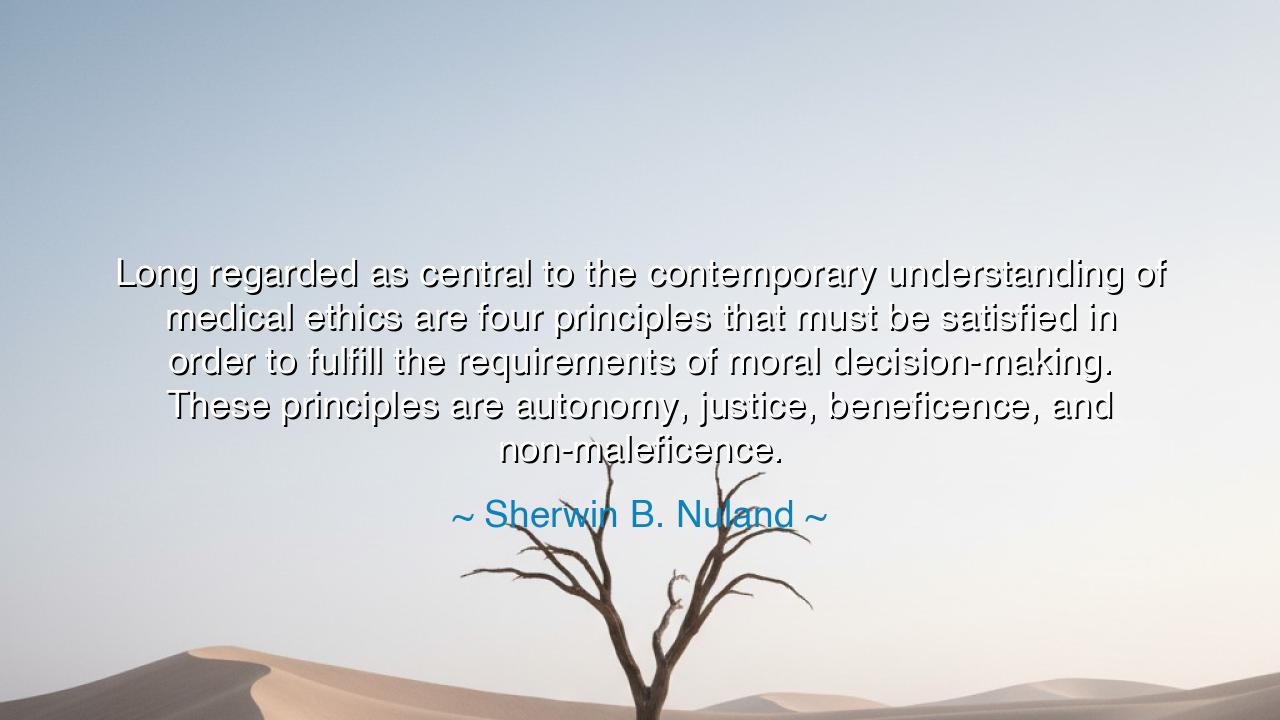
Long regarded as central to the contemporary understanding of
Long regarded as central to the contemporary understanding of medical ethics are four principles that must be satisfied in order to fulfill the requirements of moral decision-making. These principles are autonomy, justice, beneficence, and non-maleficence.






When Sherwin B. Nuland wrote, “Long regarded as central to the contemporary understanding of medical ethics are four principles that must be satisfied in order to fulfill the requirements of moral decision-making. These principles are autonomy, justice, beneficence, and non-maleficence,” he was not merely defining the code of healers — he was invoking an ancient covenant between medicine and morality. His words summon the eternal voice of conscience that has guided physicians, philosophers, and leaders since the dawn of civilization: that power without ethics becomes tyranny, and healing without virtue becomes harm. In these four pillars — autonomy, justice, beneficence, and non-maleficence — Nuland distilled the moral architecture that upholds not only medicine but the entire fabric of human trust.
To understand his wisdom, we must see these principles not as rules, but as living forces. Autonomy speaks of the sacred dignity of the individual — that no one, however wise or skilled, may rule over the body or will of another without consent. Justice demands that fairness governs all acts of healing, that no life is valued more highly than another. Beneficence, the call to do good, reminds the healer that compassion must be active, not passive. And non-maleficence, the resolve to “do no harm,” stands as the boundary between mercy and arrogance. Together, they form a circle of moral balance — a compass for the healer’s heart in the storms of complexity and power.
The origin of these principles can be traced to the ancient traditions that preceded modern science. From the Hippocratic Oath of Greece to the teachings of Confucius in the East, the healer was bound not only by skill but by virtue. In the temples of Asclepius, physicians were taught to serve life, not mastery; to see each patient as a sacred trust, not a subject of experimentation. Yet as medicine grew more powerful — as it gained the ability to prolong, reshape, and even define life itself — the need for moral boundaries grew ever more urgent. It was in the twentieth century, amid the moral reckoning that followed the atrocities of war and unethical experimentation, that thinkers like Beauchamp, Childress, and later Nuland, gave new form to these timeless truths, shaping them into the four principles that stand at the heart of modern medical ethics.
Consider the story of Dr. Ignaz Semmelweis, the Hungarian physician of the 19th century who discovered that simple handwashing could prevent the deaths of mothers in childbirth. Though his findings could have saved thousands, his peers dismissed him with scorn. They valued pride over beneficence, reputation over justice, and in doing so, they caused untold harm — violating non-maleficence in the pursuit of status. Semmelweis died forgotten, yet his story endures as a warning: that when medicine forgets its moral foundation, it betrays the very life it seeks to protect. Nuland’s words, though written centuries later, honor the spirit of men like Semmelweis — reminding us that ethical duty must stand above ego and ambition.
The ancients would have recognized these principles not as inventions, but as reflections of the natural order — what Aristotle called phronesis, or moral wisdom in action. For in every act of healing, there lies a tension between power and humility, between what one can do and what one should do. Autonomy tempers the healer’s authority with respect; justice tempers partiality with fairness; beneficence ignites compassion; and non-maleficence restrains pride. The wise healer, like a balanced ruler, must honor all four — lest he become the servant of his own will rather than the guardian of human welfare.
But Nuland’s teaching extends beyond medicine. His four principles form the foundation for all moral decision-making in the modern age. Every choice we make — as leaders, parents, citizens — is a kind of healing, for each decision either mends or wounds the world. To respect the autonomy of others is to honor their humanity; to act with justice is to restore balance; to pursue beneficence is to bring light; and to practice non-maleficence is to restrain the shadows of our own desire. In this way, we become not doctors of the body, but physicians of the soul.
Therefore, let this teaching be remembered: Wisdom without ethics is destruction, and compassion without restraint is folly. If you wish to heal — in medicine, in leadership, or in life — walk the path of the four principles. Ask before you act. Seek fairness before gain. Do good where you can, and do no harm where you cannot. These are not merely the laws of medicine; they are the laws of harmony, written in the very design of the human heart. As Nuland reminds us, to live by these principles is not only to heal others, but to heal the world itself — one act of conscience at a time.






AAdministratorAdministrator
Welcome, honored guests. Please leave a comment, we will respond soon